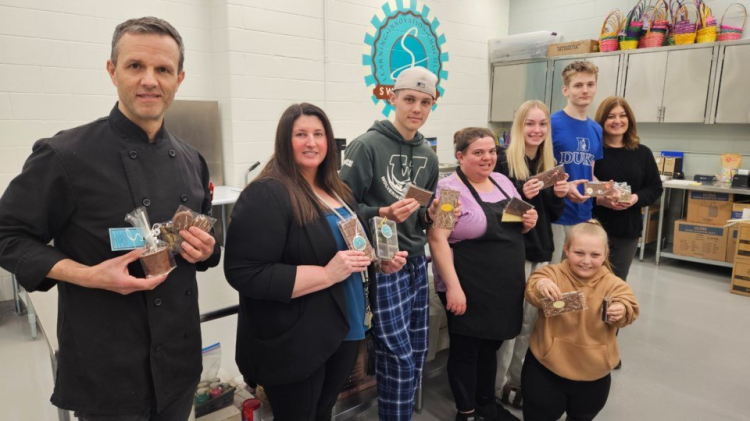Walk into White Pines Collegiate and you'll find students doing something unique: running a real chocolate business that directly funds breakfast programs across Algoma District.
Sweetened combines culinary arts, business operations, engineering innovation, and marketing strategy into one student-driven program that teaches practical skills while addressing food security.
From Small Initiative to District-Wide Impact
Sweetened evolved from Sweet Change Chocolate when the Algoma District School Board's revitalization plan at White Pines opened new possibilities in 2021. "Sweetened was born out of a desire to take a small, successful chocolate initiative and expand it into something with long-term impact for both students and the community," explains Jason Zachary, Culinary Programs and Food Security Lead. "The vision was to create a hub where students could learn hands-on skills, run a real business, and give back to the community."
The program operates with a dual purpose: providing meaningful experiential learning while using proceeds to support food equity initiatives across the district.
Why Chocolate Works Across Disciplines
"Chocolate is unique it's culinary, it's science, it's engineering, it's business, and it's storytelling all in one," notes Zachary. "I realized early on that making and selling chocolate could serve as a perfect bridge across subject areas."
Students engage with chocolate production through multiple lenses. They learn tempering and molding techniques while simultaneously developing marketing strategies, managing point-of-sale systems, understanding financial literacy, and designing custom products.
A Team Approach to Student Learning

Sweetened operates through collaboration between dedicated teachers and staff: Jason Zachary leads culinary and overall program coordination, Anthony Bumbacco handles business operations, Mark Carlucci oversees engineering, and Frank Calvano manages communications technology. Professional chocolatiers Carolyn McKay and Keshavi Patel provide industry expertise. Board office Facilities Use / Office Supervisor, Amy See, provides administrative liaison support to ensure smooth communication, scheduling, and organizational management across the program.
Each department contributes distinct elements. Business students manage sales, bookkeeping, and customer service. Engineering students create custom molds and develop product innovations. Communications technology students handle branding, photography, videography, and social media campaigns.
Culinary integration happens carefully and deliberately. "Production in the kitchen is led by our chocolatiers, Carolyn McKay and Keshavi Patel, with students carefully integrated into that process," Zachary explains. "This balance ensures both quality and authentic learning opportunities."
Skills That Transfer Beyond School
Students gain capabilities they'll use throughout their careers: operating professional-grade equipment, developing marketing strategies, managing customer relationships, and producing quality products under time constraints. "They also learn how to collaborate across disciplines, something most high school students rarely experience until much later in life," Zachary adds.
Quality standards remain non-negotiable. "We've partnered with professional chocolatiers and industry mentors to ensure students are taught authentic techniques," he notes. "Every batch has to meet the same quality standards a professional chocolate company would uphold. Students learn quickly that consistency, sanitation, and precision aren't just part of class, they're essential in business."
Chocolate Sales Fund Food Security
Every Sweetened purchase supports a larger mission. "Food equity means ensuring all students, no matter their background, have access to healthy, nutritious food," Zachary explains. "Sweetened directly supports this by funneling proceeds into ADSB's breakfast programs and food initiatives."
The program plans to use funds for breakfast program upgrades including new equipment, improved menus, and expanded service capacity. "This may include supplying schools with blenders for smoothie programs or ovens for hot breakfast items; investments that wouldn't be possible otherwise," he shares.
Building Community Connections
Sweetened maintains visibility beyond school walls through weekly appearances at the Soo Market and Greyhound home games. "These community connections are vital," says Zachary. "Being at the Soo Market or a Greyhound game allows students to interact with real customers, answer questions, and build confidence. It also helps Sweetened establish itself as a visible, active part of the local business community."
One memorable project involved producing corporate gifts for a local business where students handled everything from mold design to marketing content creation. "It gave them ownership of a professional project while building pride in seeing their work out in the community," Zachary recalls.
Lessons That Last
"I hope they leave with confidence, resilience, and an entrepreneurial mindset," Zachary says of his students. "Whether or not they pursue culinary arts, they're learning how to problem-solve, work as a team, and see the real-world impact of their efforts. These lessons last far longer than any single recipe."
The program's approach offers a model for experiential education embedded within the curriculum. Zachary sees potential for similar initiatives: "Whether that's farm-to-table initiatives, hospitality ventures, or cross-discipline projects that prepare students for both post-secondary pathways and community leadership."
Supporting Students and Community
"When you buy from Sweetened, you're purchasing chocolate," Zachary emphasizes. "And, you're investing in students' futures, in food equity for children across Algoma, and in a program that blends education with social good. Community support is what allows us to keep innovating and, most importantly, keep feeding kids."













